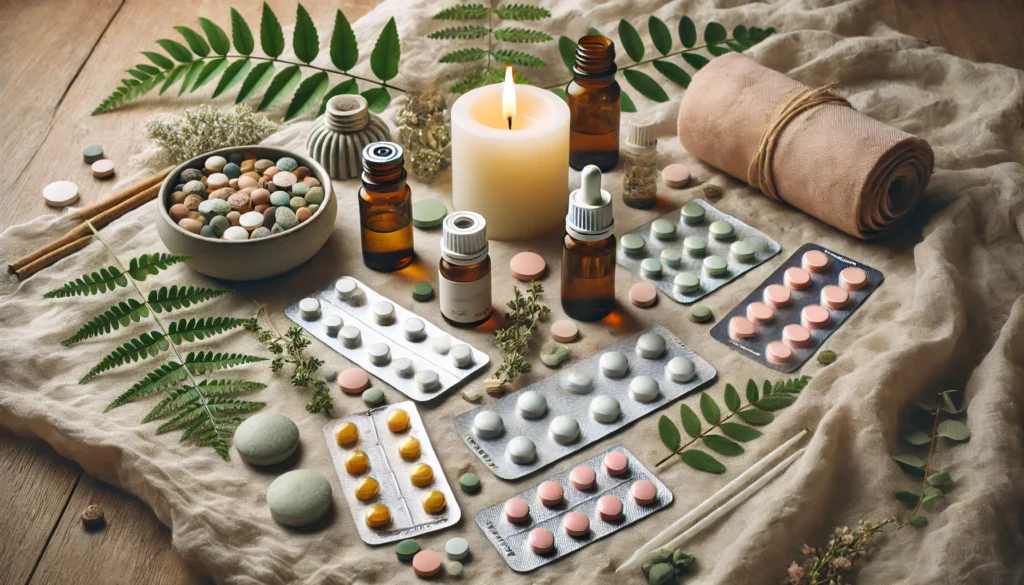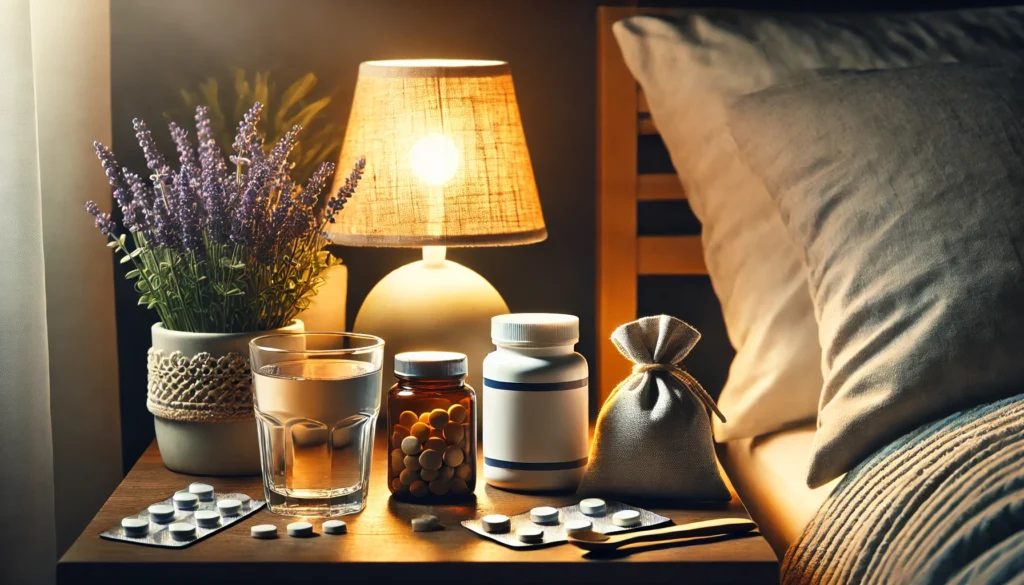Understanding Anxiety and the Appeal of Over-the-Counter Solutions
Anxiety is a deeply personal and often overwhelming experience that can affect every facet of a person’s life—from relationships and career performance to physical health and overall sense of well-being. While some individuals seek formal medical diagnoses and prescription treatments, others turn to over-the-counter (OTC) solutions, drawn by their accessibility, perceived safety, and the promise of fast relief. In an age when mental health awareness is rising but access to care remains inconsistent, OTC anti-anxiety medications and supplements are increasingly viewed as attractive first-line or adjunctive tools. However, the marketplace is crowded, and not all products deliver what they claim.
You may also like: Proven Relaxation Techniques for Stress and Anxiety: Evidence-Based Strategies to Calm Your Mind and Body
The appeal of OTC anti-anxiety meds lies in their non-prescription status. They are often perceived as safer or more natural than pharmaceutical-grade drugs, especially by those wary of side effects or the stigma sometimes associated with mental health medication. Furthermore, individuals experiencing anxiety may prefer immediate relief without the need for a doctor’s visit, which can be expensive or time-consuming. The question, then, becomes not just what is available, but what truly works, what doesn’t, and how to navigate this landscape safely and effectively.
Understanding what qualifies as over-the-counter anti-anxiety medication requires clarity. These products may range from herbal remedies and dietary supplements to antihistamines and sleep aids, all of which may have calming effects but differ significantly in their safety profiles, effectiveness, and potential interactions. For individuals struggling with symptoms such as racing thoughts, tightness in the chest, or insomnia due to stress, finding reliable and evidence-based non-prescription drugs for anxiety can be life-changing. This article offers an in-depth, science-backed guide to the best OTC anxiety medication options, exploring how they work, what to watch for, and how to choose the right one for your unique needs.
Exploring the Science Behind OTC Anti-Anxiety Options: How They Work in the Brain and Body
To truly appreciate the potential of over-the-counter anti-anxiety medications, it’s essential to understand how these compounds interact with key neurochemical systems in the brain. Many non prescription drugs for anxiety influence neurotransmitters such as GABA (gamma-aminobutyric acid), serotonin, dopamine, and norepinephrine—all of which play a crucial role in regulating mood, stress response, and emotional balance. For instance, L-theanine, a naturally occurring amino acid found in green tea, is known to increase alpha brain wave activity and promote relaxation without sedation. Magnesium glycinate, another widely used supplement, modulates NMDA receptors and supports GABAergic activity, making it one of the most neurologically active minerals in stress physiology.
Unlike prescription benzodiazepines or SSRIs, over the counter anti anxiety medication typically works through more indirect or supportive mechanisms. While this means they may offer fewer side effects and carry less risk of dependency, it also underscores the importance of realistic expectations. The best otc anxiety medication isn’t necessarily the fastest-acting, but rather the one that fits your symptom profile, health status, and long-term mental health goals. For example, someone experiencing daily low-level nervousness may benefit from adaptogens like ashwagandha or rhodiola, while a person suffering from acute episodes—such as performance anxiety—might find more relief from fast-acting agents like diphenhydramine, an antihistamine with mild sedative properties.
Moreover, there is growing recognition of the gut-brain axis in mental health, suggesting that non prescription anti anxiety drugs that support digestive health—such as probiotics or prebiotic fibers—may have secondary benefits for anxiety relief. While not traditionally classified as anti-anxiety agents, these compounds may help stabilize mood by supporting microbial diversity and reducing systemic inflammation. Thus, over the counter for anxiety attacks may one day include microbiome-based therapies alongside more familiar options. As science evolves, so too does our toolkit for emotional well-being, making it all the more critical to stay informed and open to integrative, evidence-based approaches.
When OTC Isn’t Enough: Knowing the Limits and Recognizing Red Flags
While the accessibility of otc anti anxiety meds is undoubtedly empowering, it’s equally important to recognize their limitations. Not all anxiety conditions respond well to self-guided treatment, especially when symptoms are severe, persistent, or accompanied by other mental health challenges like depression, trauma, or substance use. If you’ve been using over the counter anti anxiety options consistently without meaningful improvement—or if your anxiety interferes with work, relationships, or daily functioning—it may be time to consult a licensed mental health professional. Relying solely on supplements or non prescription anti anxiety drugs in the absence of therapy or a medical diagnosis can inadvertently delay essential care.
It’s also crucial to monitor for signs of worsening symptoms. For instance, if a supplement initially provides mild relief but leads to tolerance, dependency, or rebound anxiety, these are red flags that warrant attention. Similarly, while most otc anti anxiety products are considered safe for short-term use, some can interact negatively with medications, alcohol, or certain health conditions. Diphenhydramine, for example, may impair cognitive function or lead to over-sedation in older adults, while high doses of kava have been linked to liver toxicity in rare cases. Knowing when to pause, re-evaluate, or seek additional guidance is a vital part of any responsible wellness strategy.
In some cases, a stepped-care model may be most appropriate—starting with lifestyle changes and otc medicine for anxiety attacks, then moving to prescription options or therapy if needed. This approach allows for flexibility and personal agency while also acknowledging the complexity of anxiety as a biopsychosocial phenomenon. Ultimately, the best medication for panic attacks and anxiety over the counter is one that’s used as part of a broader plan, not as a standalone fix. Being proactive, self-aware, and willing to adapt your treatment strategy over time can significantly increase your chances of finding lasting relief.

The Role of Personalized Medicine in Choosing the Best OTC Anxiety Meds
One of the emerging frontiers in mental health treatment is personalized medicine—an approach that takes into account your genetic makeup, microbiome profile, hormone levels, and environmental stressors when designing a care plan. Although still a developing field, this perspective can be incredibly useful even when navigating the world of over the counter anti anxiety medication. For example, some individuals metabolize certain herbal compounds more efficiently than others due to genetic variations in liver enzymes. Others may have specific nutritional deficiencies—like low magnesium or vitamin D—that contribute to heightened anxiety and respond well to targeted supplementation.
Personalized approaches also consider factors such as gender, age, and lifestyle. Women experiencing anxiety related to hormonal fluctuations may benefit from supplements that support endocrine health, such as chasteberry or evening primrose oil. Athletes and high-performance professionals may favor nootropic-adaptogen blends that enhance focus without causing drowsiness. In contrast, those recovering from trauma may find grounding support in botanicals with a calming but stabilizing effect, like passionflower or lemon balm. By tailoring your choices based on your own needs, the search for the best over the counter drugs for anxiety becomes more efficient and empowering.
Technology is also changing the way people approach otc anti anxiety solutions. At-home neurotransmitter testing kits, DNA-based supplement matching algorithms, and digital apps that track mood trends are providing users with actionable insights. While these tools shouldn’t replace clinical evaluation, they can offer valuable direction in choosing over the counter for anxiety attacks that align with your biology and goals. As data-driven wellness becomes more accessible, it’s likely that the future of non prescription drugs for anxiety will become even more targeted, effective, and safe.
The Evolving Future of Anxiety Care Beyond the Prescription Pad
As society continues to grapple with the rise in anxiety disorders and the limitations of traditional healthcare systems, the relevance of otc anti anxiety meds will only grow. Yet, this expansion brings both opportunities and challenges. On the one hand, we now have access to an ever-growing arsenal of plant-based compounds, bioactive amino acids, and evidence-informed over the counter anti anxiety products that can be purchased without a prescription. On the other, the need for regulatory oversight, public education, and science-driven guidance is more urgent than ever.
Innovation in this space is moving quickly. Researchers are exploring the potential of novel compounds like cannabidiol (CBD), saffron extract, and L-tryptophan derivatives, which may soon enter the mainstream as recognized tools for emotional resilience. Meanwhile, integrative psychiatry is redefining the role of lifestyle, nutrition, and even spirituality in managing mood disorders. As the market matures, we can expect a shift toward comprehensive wellness ecosystems—where otc anti anxiety options are used in tandem with behavioral coaching, digital therapy platforms, and functional diagnostics to offer truly customized care.
For individuals navigating anxiety today, the most empowering message is this: you have options, and you are not alone. Whether you choose a simple magnesium supplement, a carefully formulated herbal complex, or a non prescription anti anxiety drug that aligns with your physiology and values, relief is possible. The key lies not in chasing a one-size-fits-all solution but in cultivating a thoughtful, informed, and flexible mindset. In doing so, you not only find the best over the counter for anxiety treatment—you also build a stronger, more self-aware foundation for lasting mental well-being.

Frequently Asked Questions (FAQ): Best Over-the-Counter Anti-Anxiety Medication Options
1. Can over-the-counter anti-anxiety medications be used alongside therapy or prescription medications?
Yes, over-the-counter anti-anxiety medications can often be used in conjunction with therapy or prescription medications, but this should always be done under medical supervision. Many individuals supplement their primary treatment with OTC anti anxiety meds to ease breakthrough symptoms or support their daily routines. However, even non prescription drugs for anxiety can interact with SSRIs, benzodiazepines, or mood stabilizers, especially those that affect serotonin, GABA, or liver metabolism. Some over the counter anti anxiety meds contain herbs or compounds that may enhance or diminish the effects of prescription drugs, which can lead to unintended consequences. It is essential to discuss any OTC product with your healthcare provider to ensure safety and compatibility with your ongoing mental health treatment plan.
2. Are there any new or emerging non prescription anti anxiety drugs worth watching?
Recent interest has grown around emerging compounds like adaptogenic mushrooms (such as lion’s mane and reishi), which may support neuroplasticity and resilience to stress. While not yet recognized as standard non prescription anti anxiety drugs, early research suggests they may play a role in modulating the body’s stress response. Another rising star in the best otc anxiety medication space is saffron extract, which has shown promise in small clinical trials for mood support and anxiety relief. Scientists are also examining novel delivery systems—such as liposomal encapsulation—to increase bioavailability of certain herbs and amino acids. As research evolves, more advanced and targeted formulations could redefine what we consider effective over the counter anti anxiety medication.
3. How does the quality and sourcing of ingredients affect the efficacy of OTC anti anxiety meds?
The efficacy of OTC anti anxiety meds hinges heavily on the sourcing, quality, and purity of ingredients. Standardized extracts of herbs like ashwagandha or passionflower often provide more consistent results than raw powder blends. Many lesser-known brands cut corners by using fillers or subclinical doses that do not deliver therapeutic effects, which is a serious issue in the over the counter for anxiety attacks market. Trusted manufacturers typically conduct third-party testing for contaminants and potency, a crucial factor when choosing the best otc anxiety meds. If a product lacks transparency about its sourcing or formulation, it is wise to look elsewhere—even if it is marketed as a natural or alternative medicine for anxiety.
4. What role does gut health play in the effectiveness of non prescription drugs for anxiety?
Emerging research in the gut-brain axis has highlighted how gut health significantly influences anxiety levels and treatment outcomes. Certain non prescription drugs for anxiety, especially those involving amino acids or probiotics, work better when the gut microbiome is in balance. Magnesium and B-complex vitamins, often found in over the counter anti anxiety medication, require adequate gut absorption to function optimally. Gut dysbiosis can hinder nutrient assimilation, thereby reducing the effectiveness of even the best over the counter drugs for anxiety. For long-term improvement, combining OTC products with probiotic-rich foods or supplements may enhance both mood stability and the efficacy of your chosen remedies.
5. Can over the counter anti anxiety meds help with social anxiety or performance-based anxiety?
Yes, certain over the counter anti anxiety meds may offer relief for social anxiety and performance-based stress, although results can vary widely. L-theanine is often praised for its ability to induce a calm but alert state, making it a popular option for public speaking or high-pressure situations. CBD, where legally available, is another non prescription anti anxiety drug that users report helps ease the fear of judgment or embarrassment in social settings. Unlike long-term solutions for generalized anxiety, acute social anxiety often requires fast-acting yet non-sedating interventions, which some otc medicine for anxiety attacks can provide. When selecting a product, consider how quickly it acts, its sedative properties, and whether it supports mental clarity under stress.
6. Are there OTC medication for panic attacks that work in emergencies?
While no over-the-counter remedy can replace fast-acting prescription medications for severe panic attacks, certain OTC medication for panic attacks may provide short-term relief during acute episodes. Diphenhydramine (an antihistamine) and L-theanine can sometimes blunt the edge of a panic response, especially when taken early in the onset. Fast-dissolving GABA tablets or chewable magnesium glycinate are also used by some for their calming effects. However, for individuals with frequent or intense panic attacks, over the counter for anxiety attacks should not be the only strategy—a comprehensive approach involving professional care is essential. OTC anti anxiety meds in this context serve best as part of a layered plan, not a standalone emergency treatment.
7. How do lifestyle factors influence the effectiveness of the best otc anxiety meds?
The best otc anxiety meds are significantly more effective when used as part of a lifestyle that supports nervous system regulation. Poor sleep, high sugar intake, chronic stress, and sedentary habits can undermine even the most promising over the counter anti anxiety medication. For example, someone taking magnesium for anxiety who also consumes high caffeine and sugar levels may experience limited benefits. Regular exercise, hydration, and a nutrient-dense diet can enhance the bioavailability and impact of non prescription drugs for anxiety. When choosing an OTC product, consider how it fits within your daily habits and whether those habits help or hinder its effectiveness.
8. Are there gender or age-related considerations when using OTC anti anxiety solutions?
Yes, hormonal fluctuations in women—especially during menstruation, pregnancy, or menopause—can influence the severity and pattern of anxiety, affecting how OTC anti anxiety solutions work. For example, magnesium and vitamin B6 may be particularly effective for premenstrual anxiety, while postmenopausal women may benefit more from phytoestrogen-containing herbs. Older adults should be cautious with sedating over the counter anti anxiety meds due to fall risks or cognitive side effects. Teenagers, meanwhile, may respond differently to dosages and should only use OTC medicine for anxiety attacks with parental guidance and medical input. Tailoring the choice of non prescription anti anxiety drugs to life stage and hormonal profile can improve outcomes and safety.
9. Is it safe to self-diagnose and treat anxiety with over-the-counter products?
While mild anxiety can often be addressed with OTC anti anxiety meds, self-diagnosis carries the risk of overlooking underlying conditions such as thyroid disorders, cardiac arrhythmias, or trauma-related disorders. Some symptoms of anxiety, such as chest pain or dizziness, may mimic other serious health issues. Over-reliance on over the counter for anxiety attacks without a proper diagnosis can delay necessary treatment and compound the problem. Moreover, some individuals may unknowingly exacerbate symptoms by combining multiple supplements without understanding their interactions. To use alternative medicine for anxiety responsibly, it’s best to consult with a mental health professional, even when beginning with non prescription drugs for anxiety.
10. How should someone transition from OTC anti anxiety meds to professional treatment?
Transitioning from over-the-counter anti-anxiety products to professional care should be a deliberate and supportive process. OTC anti anxiety meds can serve as a starting point for those exploring symptom relief, but chronic or worsening symptoms usually require deeper intervention. If over the counter anti anxiety medication no longer provides adequate support, it may be time to consider therapy, diagnostic evaluations, or prescription options. Journaling symptoms and tracking the effects of various OTC solutions can provide valuable insights for clinicians, improving the personalization of future care. Ultimately, non prescription anti anxiety drugs may complement, but should never permanently substitute, evidence-based mental health treatment when symptoms persist or escalate.

Conclusion: Choosing Safe and Effective Over-the-Counter Solutions for Anxiety Relief
Navigating the world of over-the-counter anti-anxiety medication options can feel overwhelming, especially when symptoms are urgent and relief is urgently sought. The good news is that for those who understand the nuances of their condition and approach treatment with intention and awareness, a variety of safe and effective options are available. From evidence-supported herbal extracts and amino acid supplements to targeted vitamins and responsibly used antihistamines, the landscape of non prescription anti anxiety drugs is more diverse than ever—offering something for nearly every need and preference.
However, the key to successful use lies in informed decision-making. Understanding the difference between acute versus chronic anxiety, identifying potential interactions, and aligning OTC strategies with lifestyle changes are all critical components of long-term relief. While the promise of the best over the counter for anxiety options may be appealing, true healing comes from an integrated approach that respects both science and the uniqueness of each individual.
Incorporating trusted products with clinically supported ingredients—such as L-theanine, magnesium glycinate, or standardized herbal extracts—can lead to meaningful improvements in quality of life when used properly. At the same time, skepticism toward poorly regulated or overly hyped supplements remains warranted. Consumers must be vigilant, discerning, and ideally guided by healthcare professionals when selecting the best otc anxiety meds for their needs.
Ultimately, over the counter anti anxiety medication can serve as a powerful complement to therapy, mindfulness, and self-care. When chosen wisely and used responsibly, they offer accessible pathways toward calm, clarity, and control. By staying informed and embracing a holistic perspective, those struggling with anxiety can find lasting peace—one thoughtful choice at a time.
natural anxiety relief remedies, herbal supplements for stress, calming supplements without prescription, amino acids for mood support, stress and nervous system balance, holistic approaches to anxiety, mental wellness without prescriptions, anxiety management strategies, integrative mental health tools, natural calming aids, herbal mood enhancers, adaptogens for emotional support, anxiety and gut health connection, non-addictive anxiety relief, daily anxiety support supplements, safe alternatives to anxiety meds, over-the-counter mood boosters, brain health and anxiety, lifestyle changes for anxiety, supplement stacks for anxiety relief
Further Reading:
13 Over-the-Counter (OTC) Natural Remedies for Anxiety
Over the Counter Anxiety Medication
Understanding Generalized Anxiety Disorder — Treatment
Disclaimer
The information contained in this article is provided for general informational purposes only and is not intended to serve as medical, legal, or professional advice. While Health11News strives to present accurate, up-to-date, and reliable content, no warranty or guarantee, expressed or implied, is made regarding the completeness, accuracy, or adequacy of the information provided. Readers are strongly advised to seek the guidance of a qualified healthcare provider or other relevant professionals before acting on any information contained in this article. Health11News, its authors, editors, and contributors expressly disclaim any liability for any damages, losses, or consequences arising directly or indirectly from the use, interpretation, or reliance on any information presented herein. The views and opinions expressed in this article are those of the author(s) and do not necessarily reflect the official policies or positions of Health11News.


